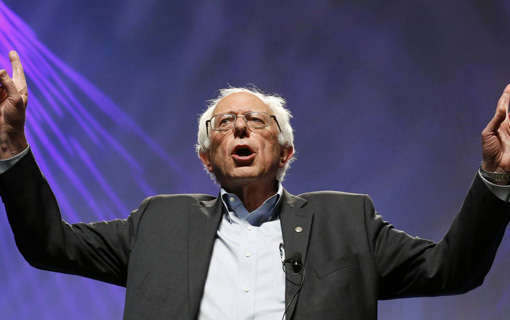
Socialist Party of America’s leader and perennial candidate for president, Eugene V. Debs, set the record for votes for a socialist candidate in 1920 when 913,693 people pulled the lever for him. However, eight years prior might have been his most successful run when he won nearly the same number of popular votes (901,551), which was nearly six percent of the total. (The 1920 percentage was 3.41, lower than in 1912, due to more Americans voting.)
In his 1912 candidacy, the Socialists leased a train called the “Red Special.” While touring the country via the rail lines, Debs spoke to more than a half million people, and the newspaper Appeal to Reason added 50,000 households to its subscription base.
Fast forward to the 2016 presidential elections. Bernie Sanders, independent, democratic socialist senator from Vermont and contender for the Democratic Party nomination, has spoken to audiences numbering in the thousands again and again. I won’t be surprised if he far surpasses Debs’ half million mark of 1912. (Since Debs was in jail for the 1920 campaign, Sanders smashed that number at his first rally!)
But relatively few people of the entire population attend political rallies. With the help of television, Sanders has spoken to dozens of millions of people already. The first Democratic debate, October 13 on CNN, had 15.3 million viewers. Two days later, on “The Ellen DeGeneres Show,” he appeared for 15 minutes (though four of those were dedicated to Breast Cancer Research fundraiser questions such as, “If you were [an ice cream flavor], what would you be called?”). The Ellen show averages 3.9 million viewers.
The following night, on “Real Time with Bill Maher” (which averages four million viewers per show), he was interviewed for seven minutes, with more serious questions, as expected from that host. Since both of these shows are on YouTube and who knows what other Internet options, many more people will view them.
All three of these appearances have been preceded, and will followed, by other discussion shows. And news shows. And more rallies. All of which are being repeated many times through the Internet. Indeed, millions of Americans have already heard, and millions more will hear, what a socialist wants from a socialist instead of our country’s many anti-socialists.
This, to me, is the most significant feature of the Sanders campaign: For the first time since Debs ran in 1912, masses of people will hear from a candidate from the Left. This is not to belittle other Socialist and Communist candidacies of the past. Clearly, Sanders has reached many, many more people than did those prior attempts. This is also not to ignore differences between the socialism of Bernie Sanders and the socialism of the Communist Party, U.S.A. or the differences between socialism and social democracy-Sanders uses the moniker “democratic socialism,” though from what I’ve heard, I would prefer the term “social democracy.”
These differences become very esoteric, given the state of affairs in the country on the very issue of what is socialism and what is capitalism. A perfect illustration of the confused mess was seen on the CNN debate. Anderson Cooper has his own prime time show (“360 ⁰”) on CNN five nights a week. He was the host of the first presidential debate. Yet it is clear he is clueless about what a capitalist is, as evidenced by asking Sanders, “You don’t consider yourself a capitalist, though?”
Capitalists own capital, either in the form of privately owned factories, buildings, mills and mines, or in the form of significant quantities of stock. Sanders, according to Roll Call, is one of the poorest U.S. senators, with a net wealth of slightly above $100,000. But that amount of wealth does imply a “decent” amount of stock ownership, so he hedged his answer by replying, “Do I consider myself part of the casino capitalist process by which so few have so much and so many have so little by which Wall Street’s greed and recklessness wrecked this economy? No, I don’t.”
Contrast that answer with Secretary Clinton’s reply. Clinton’s answer obfuscated the role of monopolies and oligopolies and was stuck in the myth of American exceptionalism. She said, “… when I think about capitalism, I think about all the small businesses that were started because we have the opportunity and the freedom in our country for people to do that and to make a good living for themselves and their families.” The Fortune 500 was lost in the shuffle, and I suppose we are to infer that Denmark, a social democracy singled out at the debate, does not have opportunities for small capitalists. Nonsense.
Sanders states emphatically that common people must unite and fight the one percent (his “political revolution”), to restore democracy that has been hijacked by billionaires and lobbyists buying politicians, to achieve a single payer health care system, to win paid family leave, and to drastically eliminate the economic inequality of our country. I call this social democracy; Sanders calls it democratic socialism. Either way, it would be an intensely massive advance in the United States.
And certainly, Sanders’ answer towers above the definitions that any of the GOP candidates might offer. Millions of Americans, especially working people who define themselves as in the working class (though they might use the term “middle class”), but also including many who call themselves “conservative” and who vote for Republicans, are saying they agree with some or much of Sanders’ platform. This represents a huge potential step forward for the entire Left in the U.S.
Photo: Ross D. Franklin/AP












Comments